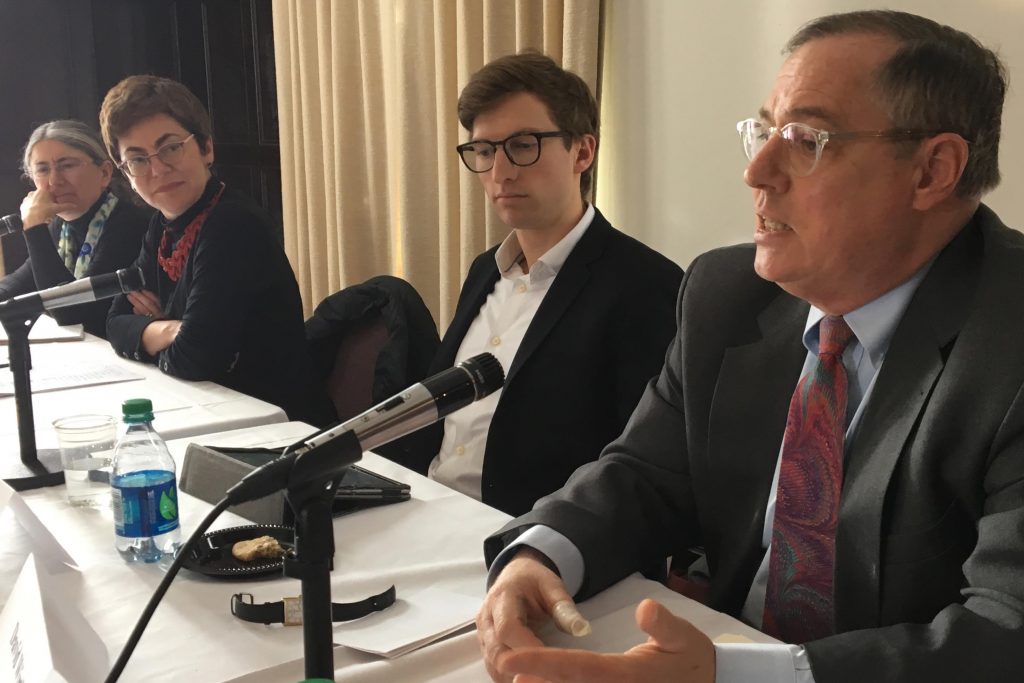From early on in the Cold War period, “reciprocity”—or tit-for-tat retaliation—has been a staple of US-Russia relations. Since the 2016 presidential election, this dynamic has continued to frame bilateral relations. On March 14, the Clough Center for the Study of Constitutional Democracy and the International Law Society co-sponsored a panel of experts who addressed the policy and political implications of the conflicts in Syria and Ukraine, and how both have contributed to the escalated tensions between the United States and Russia.
Panelists drew on both the United States and Russian perspectives and mentalities and discussed how the countries view each other. They also addressed how the two countries can work together to move policy forward on key geopolitical issues, like cybersecurity and the Arctic.
Moderator and BC Law Professor David Wirth (right) framed the conversation by speaking about his years at the State Department and the downing of Korean airline KAL007 by the Soviet Union, which believed it was an intruding US spy plane. When the US tried to send its ambassador to discuss the shooting, the USSR rebuffed him three times, Wirth said, because their minister of foreign affairs was not going to meet with a “mere ambassador.” Wirth offered the anecdote as an historic example of the pervasive reciprocity that has marked the relationship between the two countries.
Chris Miller, assistant professor of international history at the Fletcher School of Law and Diplomacy at Tufts University, offered a US point of view on the two nations’ poor relationship today, saying it is entirely Russia’s doing because it violated international law. He spoke extensively about Ukraine and how Russia has inserted itself into Middle East politics, arguing that this displaced the US as the first arbiter of the region. He then spoke about Russia’s interference in the 2016 US election, noting that even though Congress passed sanctions on Russia, the assumption is that this interference will continue.
Alexandra Vacroux, lecturer on government and executive director of the Davis Center at Harvard University, spoke from the Russian point of view, saying that reciprocity or equality is the goal for Russia. She covered three main points: First, Russia believes it is being encircled; second, Putin needs legitimacy; and third, Russia sees itself as a world power.
To the first point, she said, Russia contends that the original violation of international law was the 1999 NATO bombing of Kosovo where Russia was unable to respond and protect its ally, Serbia. Second, Putin needs legitimacy, a reason he is in power, Vacroux explained, because he is not supported by legitimate institutions—“we all know that he will win on March 18”—and Putin essentially created a new social contract when he said, “You give me the right to run Russia, and I will make Russia great again.” Third, in the Middle East and Syria, Russia is now calling the shots and is filling the vacuum that the US left behind. She believes that Russia wants a new, multipolar world order led by the US, Russia, and China.
Elizabeth A. Wood, professor of history at the Massachusetts Institute of Technology, offered some solutions. She suggested that old strategic military dialogue is needed and that we have to prioritize diplomacy. The US needs to get back to forming arms treaties because of the nuclear weapon capabilities of both countries, she said. And there is common ground to stand on: Both nations can work together to tackle new frontiers like space, and to continue to work on the Arctic and pandemics, she said.
Still, Wood pondered, what does Putin really want, a new “global order or a world without rules?”
Photo: From left, Elizabeth Wood, Alexandra Vacroux, Chris Miller, David Wirth


